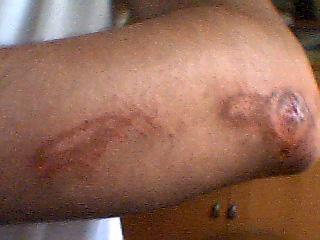Abrasion
 From Wikidoc - Reading time: 2 min
From Wikidoc - Reading time: 2 min
|
WikiDoc Resources for Abrasion |
|
Articles |
|---|
|
Most recent articles on Abrasion |
|
Media |
|
Evidence Based Medicine |
|
Clinical Trials |
|
Ongoing Trials on Abrasion at Clinical Trials.gov Clinical Trials on Abrasion at Google
|
|
Guidelines / Policies / Govt |
|
US National Guidelines Clearinghouse on Abrasion
|
|
Books |
|
News |
|
Commentary |
|
Definitions |
|
Patient Resources / Community |
|
Directions to Hospitals Treating Abrasion Risk calculators and risk factors for Abrasion
|
|
Healthcare Provider Resources |
|
Causes & Risk Factors for Abrasion |
|
Continuing Medical Education (CME) |
|
International |
|
|
|
Business |
|
Experimental / Informatics |
Editor-In-Chief: C. Michael Gibson, M.S., M.D. [1]
Overview[edit | edit source]
In dermatology, an abrasion is superficial damage to the skin, generally not deeper than the epidermis. It is more superficial than an excoriation, although it can give mild bleeding. Mild abrasions, also known as grazes do not scar, but deep abrasions may lead to the development of scarring tissue.
Causes[edit | edit source]
Most commonly, abrasion injuries occur when exposed skin comes into moving contact with a rough surface causing trauma to the upper layers of the epidermis. Such injuries, where caused by abrasive contact with textiles or carpet, are sometimes referred to as rug burn or carpet burn.
Diagnosis[edit | edit source]
Physical Examination[edit | edit source]
 |
 |
 KSF
KSF